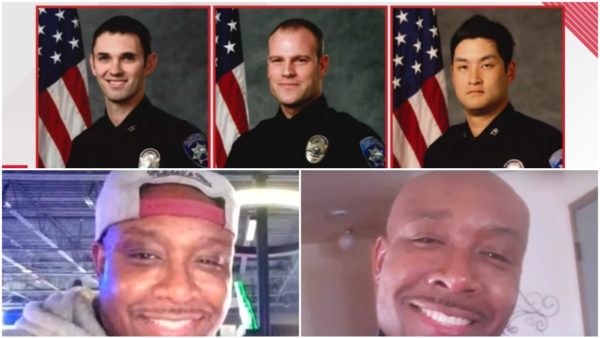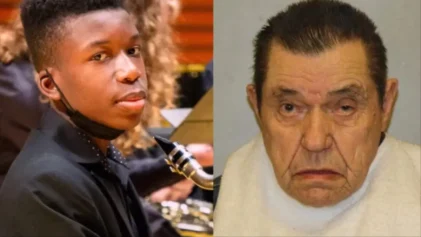Three Washington state police officers were found not guilty of all criminal charges in the fatal arrest of Manuel Ellis — a Black man who was walking home in 2020 when deputies confronted him before being pinned down and brutalized as he pleaded, “I can’t breathe.”
The more than two-month trial ended Dec. 21 as the jury acquitted Matthew Collins, 40, Christopher Burbank, 38, and Timothy Rankine, 34 — all of whom are white — on multiple charges of second-degree murder and manslaughter after defense attorneys argued that Ellis died from methamphetamine ingestion combined with the effects of an enlarged heart.
The courtroom exhaled audibly as the first verdict was read, while the defendants reacted emotionally, with Rankine wiping his eyes and Collins embracing his lawyer.

However, the verdicts left the Ellis family and Tacoma’s Black community feeling devastated.
“The biggest reason why I personally think this jury found reasonable doubt is because the defense was essentially allowed to put Manny Ellis on trial,” said Ellis family lawyer Matthew Ericksen, according to The Associated Press. “The defense attorneys were allowed to dredge up Manny’s past and repeat to the jury again and again Manny’s prior arrests in 2015 and 2019. That unfairly prejudiced jurors against Manny.”
On March 3, 2020, the 33-year-old Ellis was walking home with doughnuts from a 7-Eleven store when he passed a red light where Collins and Burbank were stopped in their patrol car.
The officers claimed they observed Ellis trying to open the door of another car at the intersection and emerged from their unit to confront him, saying Ellis turned aggressive immediately, which led to a struggle on the sidewalk.
During testimony, Collins described Ellis as having “superhuman strength,” claiming the man picked him up and threw him during the scuffle.
However, three witnesses refuted this account, saying Ellis approached the squad car but did nothing to provoke the officers and maintaining that Burbank flung open the passenger side door, which knocked Ellis to the ground.
The witnesses also testified that they yelled at officers to stop beating Ellis.
The incident was captured in part by a nearby doorbell surveillance camera, which showed Ellis with his hands in the air when Burbank shocked him in the chest while Collins got behind Ellis and applied a chokehold.
Rankine was among multiple officers who showed up to the scene after Ellis was already handcuffed on the ground, but the officer still put his knee down on the man’s back, leading to Ellis’ desperate pleas to be let up.
“I can’t breathe, sir. I can’t breathe, sir. I can’t breathe,” Washington Assistant Attorney General Kent Liu told jurors in October when describing Ellis’ last words.
On the video, one of the responding officers can be heard saying, “Shut the (expletive) up, man.”
Rankine testified that he was unmoved as Ellis begged him to get off his back as the man struggled to breathe.
“The only response at that point that I could think of is, ‘If you can talk to me, you can still breathe,’” Rankine testified.
Three years ago, the Pierce County medical examiner ruled Ellis’ death was a homicide caused by oxygen deprivation.
Collins’ defense attorney, Casey Arbenz, hailed the verdict as “a huge sigh of relief” for all three officers, saying they “should never have been charged.”
Ellis’ death coincided with the outbreak of the COVID-19 pandemic and received little attention compared to the police killing of George Floyd more than two months later in Minneapolis, which sparked months of fierce protests across the nation.
The charges were filed against the officers under a relatively new state law aimed at making it easier to prosecute police accused in cases of excessive force.
The Ellis case was the first to test the 2018 law known as Initiative 940, which eliminated a unique requirement that prosecutors prove officers acted with actual malice to bring criminal charges.
It also mandated independent investigations following instances where the use of force led to death or severe bodily harm, among other provisions.
Ericksen noted that the acquittals in Ellis’s death highlighted some gaps in the I-940 measure but said the five-year-old law remains one of the “necessary building blocks to hopefully get to some police accountability.”
“We’re better off having I-940 than not,” he said, according to AP. “I sincerely hope this one verdict does not deter future investigations and prosecutions, and I know the Ellis family feels the same way.”
Following the acquittals, a large crowd of protesters blocked an intersection in Tacoma while chanting, “No justice, no peace!”
Later in the day, about 100 people gathered at the same site for a night-time vigil in front of a mural of Ellis.
Washington Attorney General Bob Ferguson thanked the jury for its decision and praised his staff “for their extraordinary hard work and dedication.”
“I know the Ellis family is hurting, and my heart goes out to them,” he said.
Previously, the Pierce County Sheriff’s Office faced criticism for mishandling the investigation after failing to reveal that one of its own deputies was involved in restraining Ellis, leading to the creation of a new independent office dedicated to investigating police misconduct.
The city of Tacoma said the verdicts won’t impact an ongoing internal affairs investigation, the results of which are expected to be announced by Tacoma Police Chief Avery Moore within two weeks, accompanied by a decision on potential disciplinary actions for the officers “up to and including termination.”
Last year, the Ellis family settled a federal wrongful death lawsuit against Pierce County, where Tacoma is located, for $4 million.
The officers still face a separate lawsuit from Ellis’ family, filed in U.S. District Court in September 2021, that had been on hold due to the criminal trial. The civil case includes claims against two additional officers — Masyih Ford, who helped restrain Ellis, and Armando Farinas, who placed a spit hood on the victim — who were cleared to return to duty after an internal review found they did nothing wrong.


